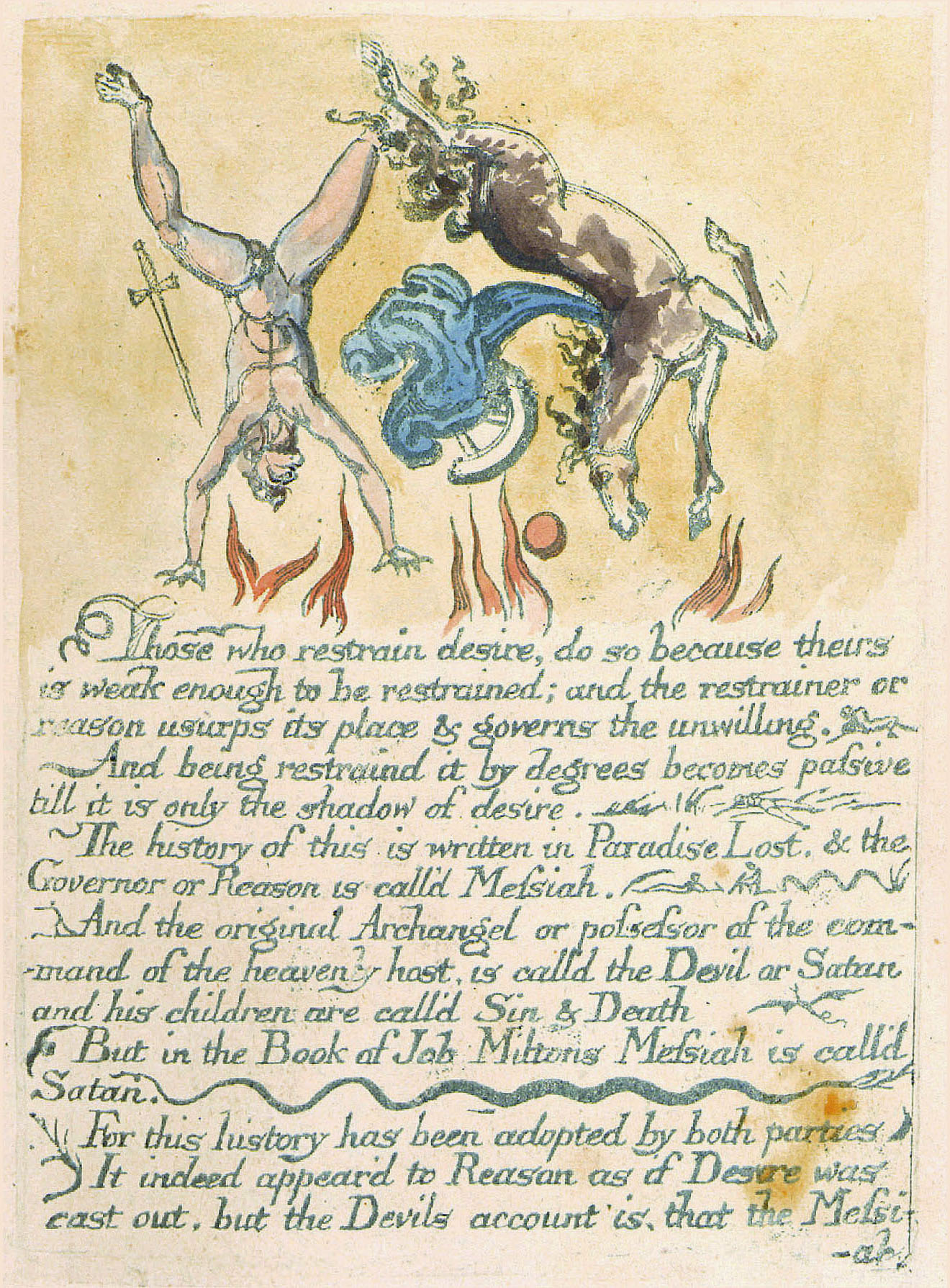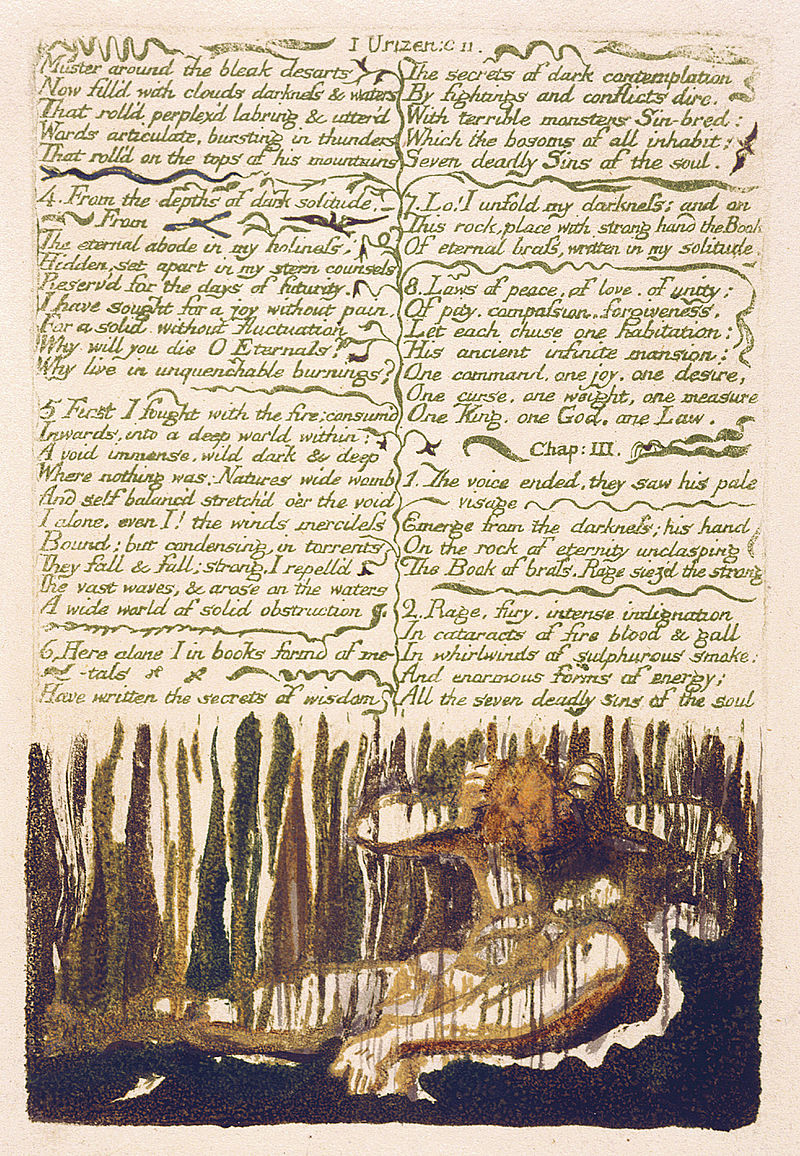The fall of Urizen
 |
British Museum
Book of Urizen
Copy B, Plate 8
|
The first mentions of Urizen are in Visions of Daughters of
Albion, America, and Europe. The First
Book of Urizen is devoted to a struggle between Los and
Urizen which results in mankind being "bound down to earth by
their narrowing perceptions."
The Publishers Note in Dover Publications' Book of Urizen states:
"The Book of Urizen recounts the creation of the world and of
mankind and explains man's fall from unity with the spiritual and
the eternal to a state of dualistic isolation in a merely
materialistic reality."
This image of Urizen printed on a separate page bears the
inscription, "Frozen doors to mock The World: while they within
torments uplock." Erdman's comment on this
inscription is that Urizen's chains forged by his own mind to mock
the world instead lock him into his own torments. (The
Illuminated Blake)
America, Plate 8, (E 54)
"The terror answerd: I am Orc, wreath'd round the accursed tree:
The times are ended; shadows pass the morning gins to break;
The fiery joy, that Urizen perverted to ten commands,
What night he led the starry hosts thro' the wide wilderness:"
Visions of Daughters of Albion, Plate 5, (E 48)
"But when the morn arose, her lamentation renewd,
The Daughters of Albion hear her woes, & eccho back her sighs.
O Urizen! Creator of men! Mistaken Demon of heaven:
Thy joys are tears! thy labour vain, to form men to thine image.
How can one joy absorb another? are not different joys
Holy, eternal, infinite! and each joy is a Love."
 |
British Museum
Book of Urizen
Copy B, Plate 8
|
 |
| British Museum Book of Urizen Copy D, Plate 20 |
| |
America, Plate 8, (E 54)
"The terror answerd: I am Orc, wreath'd round the accursed tree:
The times are ended; shadows pass the morning gins to break;
The fiery joy, that Urizen perverted to ten commands,
What night he led the starry hosts thro' the wide wilderness:"

Wikipedia Commons
America
Copy A, Plate 10
Visions of Daughters of Albion, Plate 5, (E 48)
"But when the morn arose, her lamentation renewd,
The Daughters of Albion hear her woes, & eccho back her sighs.
O Urizen! Creator of men! Mistaken Demon of heaven:
Thy joys are tears! thy labour vain, to form men to thine image.
How can one joy absorb another? are not different joys
Holy, eternal, infinite! and each joy is a Love."
Four Zoas, Night V, PAGE 65, (E 344)
Having been transformed by his encounter with Milton, Urizen casts off his Selfhood and is given a human form. A subdued Urizen is shown on Plate 45 of Milton.
"Thy pure feet stepd on the steps divine. too pure for other feet
And thy fair locks shadowd thine eyes from the divine effulgence
Then thou didst keep with Strong Urthona the living gates of heaven
But now thou art bound down with him even to the gates of hell
Because thou gavest Urizen the wine of the Almighty
For steeds of Light that they might run in thy golden chariot of pride
I gave to thee the Steeds I pourd the stolen wine
And drunken with the immortal draught fell from my throne sublime
I will arise Explore these dens & find that deep pulsation
That shakes my caverns with strong shudders. perhaps this is the night
Of Prophecy & Luvah hath burst his way from Enitharmon
When Thought is closd in Caves. Then love shall shew its root in deepest Hell"
Four Zoas, Night IX, Page 120, (E 389)
"The Eternal Man sat on the Rocks & cried with awful voice
O Prince of Light where art thou I behold thee not as once
In those Eternal fields in clouds of morning stepping forth
With harps & songs where bright Ahania sang before thy face
And all thy sons & daughters gatherd round my ample table
See you not all this wracking furious confusion
Come forth from slumbers of thy cold abstraction come forth
Arise to Eternal births shake off thy cold repose
Schoolmaster of souls great opposer of change arise
That the Eternal worlds may see thy face in peace & joy
That thou dread form of Certainty maist sit in town & village
While little children play around thy feet in gentle awe
Fearing thy frown loving thy smile O Urizen Prince of light"
Four Zoas, Night IX, Page 122, (E 391)
"Urizen Said. I have Erred & my Error remains with me
What Chain encompasses in what Lock is the river of light confind
That issues forth in the morning by measure & the evening by carefulness
Where shall we take our stand to view the infinite & unbounded
Or where are human feet for Lo our eyes are in the heavens
He ceasd for rivn link from link the bursting Universe explodes
All things reversd flew from their centers rattling bones
To bones join, shaking convulsd the shivering clay breathes
Each speck of dust to the Earths center nestles round & round
In pangs of an Eternal Birth in torment & awe & fear"
Milton, Plate 18 [20], (E 112)
"Urizen emerged from his Rocky Form & from his Snows,
Plate 19 [21]
And he also darkend his brows: freezing dark rocks between
The footsteps. and infixing deep the feet in marble beds:
That Milton labourd with his journey, & his feet bled sore
Upon the clay now chang'd to marble; also Urizen rose,
And met him on the shores of Arnon; & by the streams of the brooks
Silent they met, and silent strove among the streams, of Arnon
Even to Mahanaim, when with cold hand Urizen stoop'd down
And took up water from the river Jordan: pouring on
To Miltons brain the icy fluid from his broad cold palm.
But Milton took of the red clay of Succoth, moulding it with care
Between his palms: and filling up the furrows of many years
Beginning at the feet of Urizen, and on the bones
Creating new flesh on the Demon cold, and building him,
As with new clay a Human form in the Valley of Beth Peor."
 |
| Library of Congress Milton Copy D, Plate 45 |
Having been transformed by his encounter with Milton, Urizen casts off his Selfhood and is given a human form. A subdued Urizen is shown on Plate 45 of Milton.
_-_Google_Art_Project.jpg)













